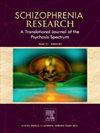Perceived stigma and self-stigma in young people at ultra-high risk for psychosis: Associations with identity-related, psychological and functional outcomes
IF 3.5
2区 医学
Q1 PSYCHIATRY
引用次数: 0
Abstract
Background and hypothesis
Perceived stigma and self-stigma negatively affect identity-related, psychological and functional outcomes among stigmatised populations. There is limited research exploring the impact of stigma among young people at ultra-high risk (UHR) for psychosis. We investigated the association of perceived stigma and self-stigma with these outcomes in young people at UHR.
Methods
Young people meeting the UHR criteria (N = 61) aged 12—25 years were recruited. Participants completed an online survey including UHR-specific measures of perceived stigma and self-stigma, as well as self-esteem, self-efficacy, self-compassion, psychological distress, perceived stress and disclosure distress. All participants took part in the CanARY trial in which they completed measures of depression, anxiety, attenuated psychotic symptoms, and social and occupational functioning. Multiple regressions explored perceived stigma and self-stigma as predictors of identity-related (i.e., self-esteem, self-efficacy, self-compassion), psychological and functional outcomes.
Results
Bivariate correlations between perceived stigma, self-stigma, and all outcomes were in the expected direction and generally moderate in size, except for psychological symptoms (i.e., anxiety, depression, and positive psychotic symptoms). Perceived stigma, but not self-stigma, was positively associated with disclosure distress, For regressions, self-stigma uniquely and negatively predicted self-esteem, psychological distress, and perceived stress.
Conclusions
Perceived stigma and self-stigma are related to harmful outcomes among young people at UHR. Self-stigma may be more damaging to self-related aspects, whereas perceived stigma may be more damaging to interactions with others. Understanding the long-term impacts of perceived stigma and self-stigma, and what factors mitigate these experiences, is important for supporting young people at UHR.
精神病超高风险年轻人的感知耻辱和自我耻辱:与身份相关、心理和功能结果的关联
背景与假设在被污名化人群中,感知污名和自我污名会对身份相关的心理和功能结果产生负面影响。目前关于精神疾病超高风险(UHR)年轻人中耻辱感影响的研究有限。我们调查了UHR年轻人的感知耻辱和自我耻辱与这些结果的关系。方法招募年龄12 ~ 25岁符合UHR标准的青年(N = 61)。参与者完成了一项在线调查,包括对感知耻辱和自我耻辱、自尊、自我效能、自我同情、心理痛苦、感知压力和披露痛苦的特定测量。所有参与者都参加了CanARY试验,在试验中,他们完成了抑郁、焦虑、精神病症状减轻以及社会和职业功能的测量。多元回归探讨了感知耻辱和自我耻辱作为身份相关(即自尊、自我效能、自我同情)、心理和功能结果的预测因子。结果除心理症状(即焦虑、抑郁和阳性精神病症状)外,感知病耻感、自我病耻感与所有结果的双变量相关性均符合预期方向,且总体上为中等。在回归分析中,自我耻辱感对自尊、心理困扰和感知压力具有独特的负向预测作用。结论认知耻感和自我耻感与健康风险青年人的有害后果有关。自我耻辱可能对自我相关方面更具破坏性,而感知耻辱可能对与他人的互动更具破坏性。了解感知到的耻辱感和自我耻辱感的长期影响,以及减轻这些经历的因素,对于支持世界卫生组织的年轻人非常重要。
本文章由计算机程序翻译,如有差异,请以英文原文为准。
求助全文
约1分钟内获得全文
求助全文
来源期刊

Schizophrenia Research
医学-精神病学
CiteScore
7.50
自引率
8.90%
发文量
429
审稿时长
10.2 weeks
期刊介绍:
As official journal of the Schizophrenia International Research Society (SIRS) Schizophrenia Research is THE journal of choice for international researchers and clinicians to share their work with the global schizophrenia research community. More than 6000 institutes have online or print (or both) access to this journal - the largest specialist journal in the field, with the largest readership!
Schizophrenia Research''s time to first decision is as fast as 6 weeks and its publishing speed is as fast as 4 weeks until online publication (corrected proof/Article in Press) after acceptance and 14 weeks from acceptance until publication in a printed issue.
The journal publishes novel papers that really contribute to understanding the biology and treatment of schizophrenic disorders; Schizophrenia Research brings together biological, clinical and psychological research in order to stimulate the synthesis of findings from all disciplines involved in improving patient outcomes in schizophrenia.
 求助内容:
求助内容: 应助结果提醒方式:
应助结果提醒方式:


